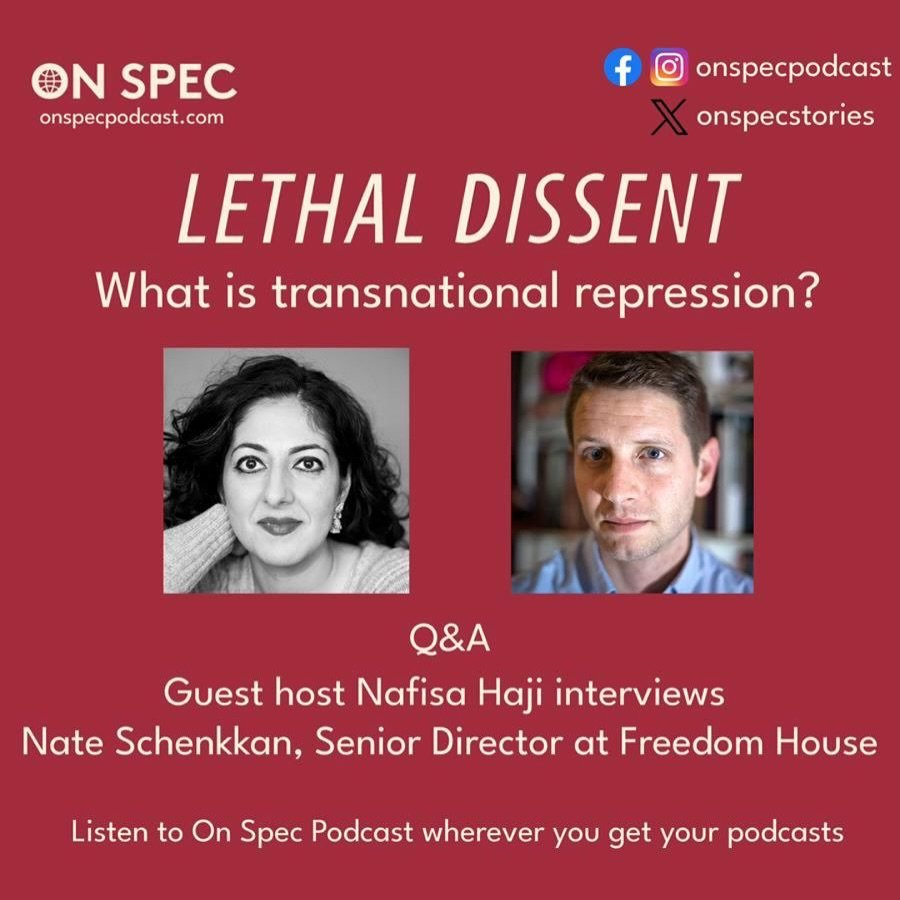Migration & Exile
Season 5: Lethal Dissent
Host Nafisa Haji speaks with Nate Schenkkan, Senior Director of Research at Freedom House, about Transnational Repression. The term is familiar in policy circles and academics but what’s the meaning behind these two words? Who’s accountable for protecting dissidents targeted beyond their own borders by their own countries, and how is policy shaped in a global setting when sometimes countries are both protector and perpetrator?
Guest host Nafisa Haji interviews reporter Fariba Nawa about the adventures of reporting Lethal Dissent for two years, getting threats and the feedback the show received from listeners.
In the final episode, Mohammad Shabani’s suicide note is analyzed by a handwriting expert and Fariba Nawa gets the results. She follows the ripple effects of the new information, and Mohammad’s best friend tries to make sense of what it means.
The death of poet Mohammad Shabani, an Iranian dissident living in Turkey, catches his friends, family, and supporters by surprise. Fariba Nawa finds one of Mohammad Shabani’s confidantes and learns new details about his life in exile before he died.
When two close friends who work for the Iranian government follow their conscience, it puts them at odds with the regime. Now one of them is dead. To figure out what might have happened, reporter Fariba Nawa goes back to the beginning.
Reporter Fariba Nawa introduces her investigation into Iranian plots against exiles in Turkey. She tells the story of Iran’s history of violence against its citizens at home, and how that violence has grown to cross international borders today. The fate of a dissident in France becomes a blueprint for the questions she seeks to answer.
Season 4: The Walls We Build
Guest Host Nadene Ghouri takes us with her as she visits the Ukrainian woman who was the surrogate mother for her child. Nadene explains what the experience has taught her about the bond between mother and child, and what it means for women to control their own bodies.
Host Nadene Ghouri and journalist Bartholomäus von Laffert talk about On Spec's episode “Spy on the Mediterranean”, which tells the story of how activists working to save the lives of migrants and refugees crossing the Mediterranean have found themselves facing criminal charges for their work.
Europe is prosecuting human rights activists that help save lives in the Mediterranean Sea, where thousands of migrants and refugees have drowned as they attempt to evade some of the world’s most powerful naval forces and reach European shores in search of a better life. The charges, allegations of human trafficking that could land activists in prison for decades, have been helped along by a spy, a former private security guard who posed as a sympathetic worker on rescue boats and passed on information to Italian authorities and right-wing politicians. Journalist Bartholomäus von Laffert spent years with many of the people at the center of the case, and introduces us to the activists and spies whose allegations could end up making an already dangerous sea crossing even deadlier.
Guest Host Nadene Ghouri tells the story of how her search for a surrogate mother for her child brought her to Ukraine, and how she found herself repaying the ultimate kindness by helping one woman flee the war there.
The French town of Calais is at the heart of a massive security infrastructure program meant to keep refugees and migrants from crossing the English Channel into the United Kingdom. Over the past 20 years, French and British authorities have spent hundreds of millions of pounds on walls, fences, different types of cameras, more police and security agents to keep people away from the shores. In order to do so, private firms have benefited from multi-year contracts to build, maintain or operate in the city and specifically around the port and railway tunnel areas.
Rights organizations and other NGOs say that the infrastructure only forces migrants and refugees to seek out more perilous routes to the UK. Journalists Margaux Benn and Judith Chetrit report from the ground and shed light on this corner of Fortress Europe.
Season 3: Disinformation
Turkey hosts the largest number of refugees in the world, but they are facing a brutal backlash from Turkish society. In February 2020, during the onset of the pandemic, the Turkish government misinformed refugees that they could leave Turkey and enter Greece. Turkish photojournalist Özge Sebzeci boarded a bus from Istanbul to Greece filled with migrants headed to Europe, and she tells the story of their journey. Then she weaves in the Turkish narrative by getting to know an anti migration politician and a pro-refugee activist to understand how they shaped their opinions.
Season 1: On Spec
Phoenix is one of the fastest growing cities in the U.S., an example of urbanization shaped by generations of immigrants. An Arizona native, journalist Alisa Reznick gives a tour of the old and new Greater Phoenix through the eyes of her extended family, who came three generations ago from Mexico, and new migrants struggling to get asylum.
Oscar Durand brings you the story of a Bolivian street musician in Istanbul, who like the rest of us, wonders where the years have gone and what he will do with his life. Oscar, a Peruvian and former engineer, found a common bond with Rupi on speaking Spanish and the meaning of life. (Rupi's name has been changed per his request.)












